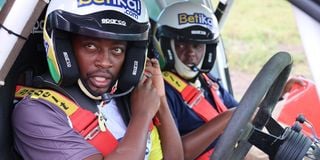Premium
Crew of a kind: Wanyoike and Njoroge gear up for Safari Rally

Andrew Wanyoike (left) and his navigator Edward Njoroge in Nairobi on May 25, 2021.
What you need to know:
- Africans continued appearing in the Safari Rally and soon after independence, government agencies invested heavily in promoting motorsport among Africans, an initiative recently revived through the Talanta Hela women’s rally team
- There are only six other Kenyans in the main World Rally Championship (WRC) Safari Rally
- Wanyoike says he is burdened by an overwhelming feeling of national duty when he lines up for start of the Safari Rally outside the KICC on March 28
Andrew Wanyoike and his navigator Edward Njoroge are the only indigenous African drivers in the 2024 World Rally Championship Safari Rally, 66 years since four drivers with big dreams became the first Kenyans to compete in the iconic motoring event.
This year’s event will take place from March 28 to 31 in Nairobi and Naivasha.
In 1958 when Kenya’s first president Mzee Jomo Kenyatta and other freedom fighters were still in prison in Lokitaung, Turkana, and independence was five years away, Karoki Gikaria and Otinda Ondongo, driving a Ford Anglia car, and Maina Kipsoke/ Toiyon Kipsoke piloting a Morris Minor 100, became the first Africans to challenge the White master in the sixth Coronation Safari Rally.
There is no recorded history of who these four men were and how they could undertake such a gallant and expensive effort at a time when Africans did not own cars and many of them were either truck or agricultural machinery drivers in white farms.
Taking part in the Safari Rally and roaming around a region that was gripped with anxiety due to agitation for independence by the Kenya Land and Freedom Forces KLFF (Mau Mau fighters) which made movement by foot or in cars dangerous in most of central Kenya, Nairobi and Rift Valley, was not wise then for unarmed Africans like the four drivers.
Usually, under similar circumstances around the world, sports is postponed. It was not the case with the Coronation Safari Rally which stuck to the Easter date and drivers passed through hostile territory without any problems due to the appeal of the Safari Rally.
The four history-making men retired early in the Safari Rally which required massive support and finances but their dream inspired a young population across East Africa, which elevated them to history-making heroes.
Africans continued appearing in the Safari Rally and soon after independence, government agencies invested heavily in promoting motorsport among Africans, an initiative recently revived through the Talanta Hela women’s rally team. Wanyoike, though happy with the current efforts, feels it should also consider men, track record, age and commitment to make a long-term impact.
He feels rally schools require similar initiative by all stakeholders, including himself as he has had a similar plan for a long time from his interactions with many young Kenyans in tarmac racing scenes.
Many young Kenyans follow Nyahururu and Masinga Dam time trials but the rigid nature of Kenya National Rally Championship (KNRC) and the attendant cost of the competition locks them out.
Karoki and Kipsoke were to become a huge influence later.
Immediately after independence, Kenya African Drivers Club was formed, followed by Armed Forces and Prisons rally teams, all for the purpose of developing the sport among young Africans.
Ultimately, Ugandan Sospeter Munyegera, navigated by Kenyan in a Datsun 1600SSS car, made history by becoming the first Africans to conquer the Safari Rally. Eliud Thuka and Peter Shiyukha would follow in their footsteps in 1972.
Afterwards, Africans had a rather inconsistent record in the event, save for the period between 1987 to 1996 when Patrick Njiru, and Jonathan Toroitich first became regular finishers, and gradually climbed the ladder to the top, Njiru finishing fourth overall in 1994 and Toroitich fifth in 1997.
This raised expectations across the globe that one day a black man would dominate rallying the way seven-time Formula One world champion Lewis Hamilton has done in circuit racing. But this was followed by a steep decline due to lack of resources, corporate sponsorship and government support.
But this appears to be a mirage due to lack of resources and the changing world of motorsports, where the best rally car retails for Sh160 million.
Unlike 1958 when there was optimism following the release of Mzee Jomo Kenyatta, impending independence and Joginder Singh matching or beating white drivers in Corronation Safari Rally, reality is sinking in 2024 that rallying is facing a very bleak future even with the efforts of drivers like Wanyoike and Njoroge..
There are only six other Kenyans in the main World Rally Championship (WRC) Safari Rally. Wanyoike says he is burdened by an overwhelming feeling of national duty when he lines up for start of the Safari Rally outside the KICC on March 28.





